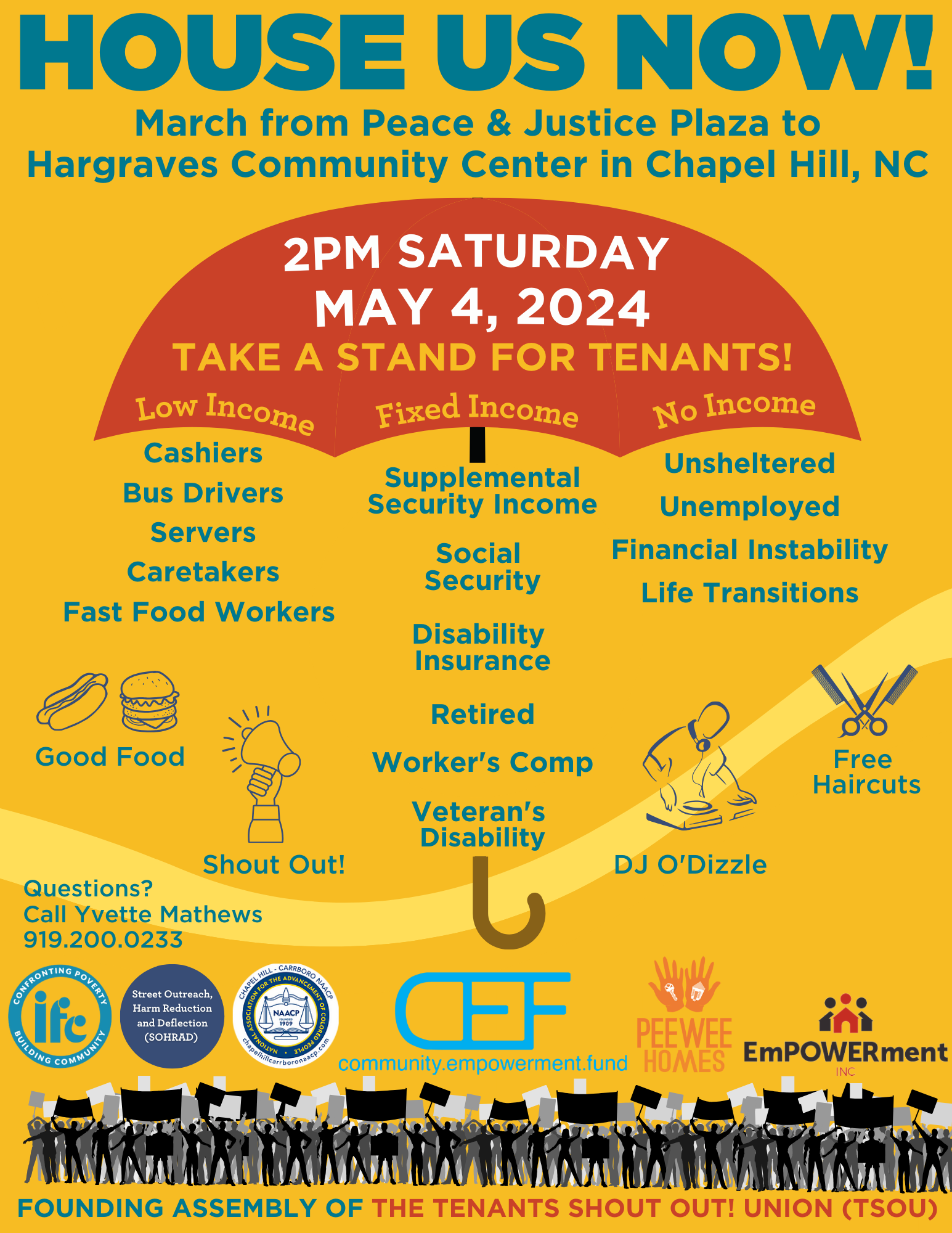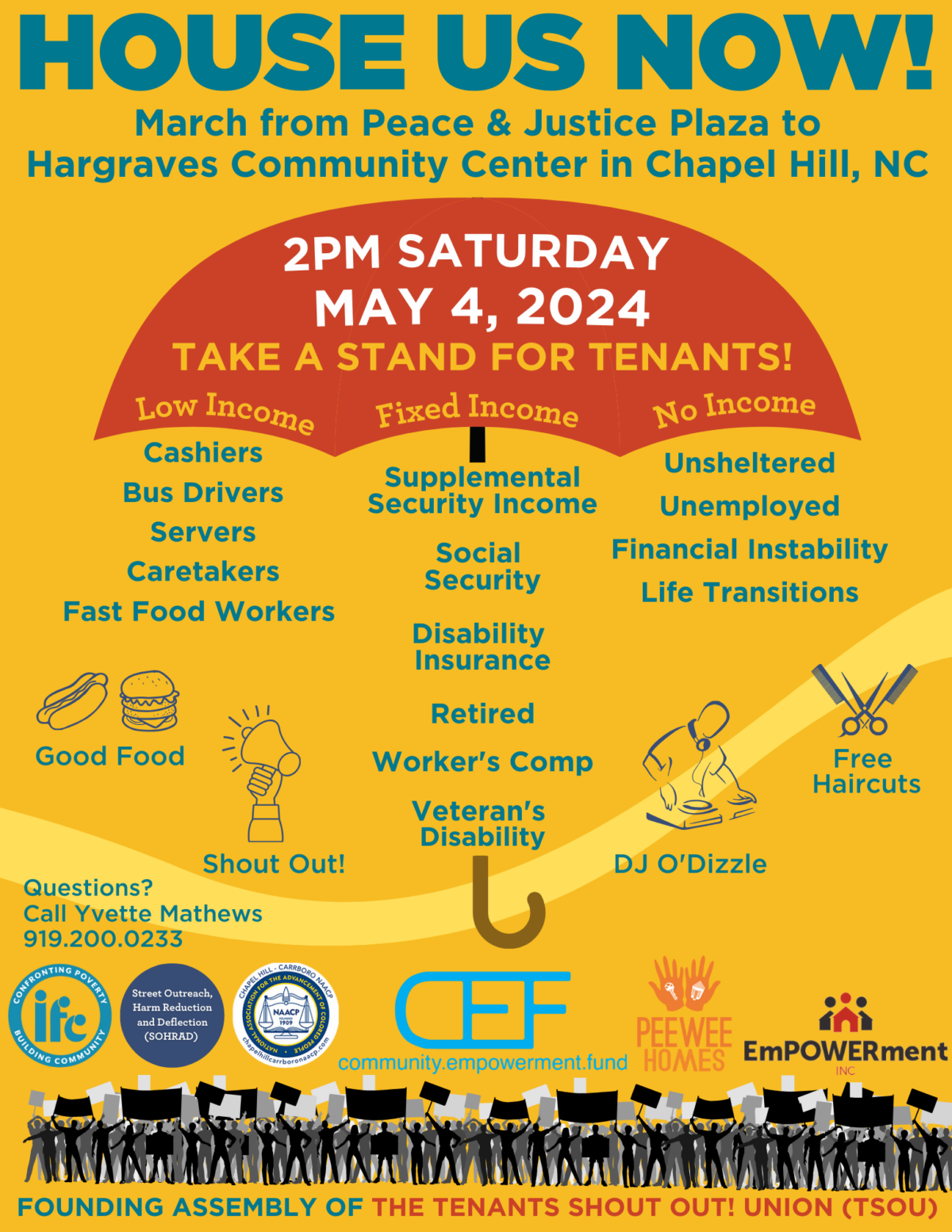By: Advocacy Team at the Community Empowerment Fund
Progress has been made to build more affordable housing.
It’s not nearly enough.
Decision-makers still sit on their hands and pretend routine building fixes are needed more than roofs over people’s heads. Power-holders still dramatically underfund services for our unhoused neighbors. People are still getting evicted, leaving voids where homes should be, getting displaced over the county line. The rent is still too high. The fact that the exact people who make Chapel Hill run can’t afford Chapel Hill is a moral catastrophe. The community has to prioritize affordable housing for tenants living at or below 30% of the Area Median Income (AMI) as our central priority until everyone has a home.
The demand for deeply affordable housing is concrete for a reason. Not all “affordable housing” is affordable. Our community desperately needs homes for fixed-income, low-income, and no-income tenants who disproportionately belong to the Black working class. That’s not 80% AMI. That’s not 60% AMI. Fixed-income, low-income, and no-income means 30% of the Area Median Income (AMI) or below. Community members on fixed incomes might be on Social Security, disability, or worker’s comp. Low-income people include essential workers, cashiers and bus drivers and fast food workers. No-income tenants may be unsheltered, unemployed, or going through life transitions. We understand and stand for these tenants because many of us come from a background of poverty and housing insecurity.
This year, we will raise our voices higher than ever before as we seek to educate the community on the needs of our most vulnerable tenants. Joined by tenants from Durham County and allies from across the Triangle, as well as beyond the state lines, we will march from Peace and Justice Plaza to Hargraves Community Center: the 2024 House Us Now March on Saturday, May 4, right down Franklin Street.

This year’s march is just the start. Recently, the Community Empowerment Fund launched the House Us Now strategic campaign for housing justice out of the House Us Now annual march. The conditions necessary to win more actually affordable housing for 30% AMI and below requires targeted outreach, popular education, and creating bonds of mutual aid through a shared community. We have to also build the base of directly-impacted tenants with lived experience organized together: a “tenant union,” a member-led organization of people who all don’t control our housing, united to support one another through collective action.
Tenant unions have successfully organized against rent hikes and evictions, to educate one another on tenants’ rights, and to help neighbors with Housing Choice Vouchers (HCV) stay in their homes, to name a few victories since 2020 alone. We’re supporting tenants organizing in their buildings and neighborhoods through training, community classes, and fostering community. We believe in people making decisions for themselves, in determining their own futures, so we aim to support the tenant union to become member-led and member-run in line with the autonomous tenants’ movement nationwide. To tie these organizing efforts together, the 2024 House Us Now March led by fixed-income, low-income, and no-income tenants below 30% AMI from across Orange and Durham Counties will also be the founding assembly of the Tenants Shout Out! Union (TSOU).
Since we launched the 2024 House Us Now campaign, people have raised questions about organizing the community in order to fight for affordable housing for 30% AMI. As a 501(c)(3), the Community Empowerment Fund (CEF) is barred from “lobbying” as a substantial part of our work. We understand our advocacy as an extension of our member services aiming to support people in achieving their financial goals in the mission to close the racial wealth gap. Lobbying, defined, is attempting to influence specific legislation. Educating decision-makers is not lobbying. Educating the public is not lobbying. Supporting tenants in organizing with their neighbors because they share the same issues and are more powerful together is not lobbying. Supporting fixed-income, low-income, and no-income tenants organizing against their displacement is not lobbying anymore than supporting tenants in obtaining housing is lobbying. Neither has to do with specific legislation.
We need homes even as we organize. We call on our community to focus on serving fixed-income, low-income, and no-income tenants at or below 30% AMI. We hope you join us in solidarity on Saturday, May 4, as we educate the community on the needs of our most vulnerable neighbors.

